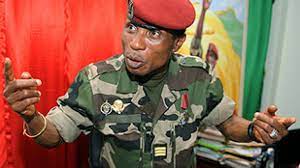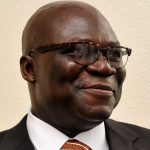Guinea Ex-Ruler Camara, Others Face Trial For Alleged Massacre Of Protesters In 2009
African News, Latest Headlines, News Around Africa, West Africa Wednesday, September 28th, 2022
(AFRICAN EXAMINER) – The trial of Guinea former military ruler, Captain Moussa Dadis Camara and 10 others from the Guinean security forces, for the alleged massacre and rape of protesters in 2009 started on Wednesday.
Camara and others are facing trial for the alleged massacre of over 150 people and the rape of at least a dozen women in Guinea’s capital, Conakry.
Camara has denied responsibility for the incident, blaming it on errant soldiers, including his former aide-de-camp Lieutenant Aboubacar Toumba Diakite, who was also among those indicted.
On Sept. 28, 2009, thousands of pro-democracy demonstrators held a peaceful protest in the stadium to pressure Camara not to stand for election as president of Guinea.
According to Human Rights Watch, the Presidential Guard carried out a premeditated massacre of at least 150 people and brutally raped dozens of women.
It said the Red berets shot at opposition supporters until they ran out of bullets, then continued to kill with bayonets and knives.
Georgette Gagnon, Africa director at Human Rights Watch said, “this was clearly a premeditated attempt to silence opposition voices.
“Security forces surrounded and blockaded the stadium, then stormed in and fired at protesters in cold blood until they ran out of bullets.
“They carried out grisly gang rapes and murders of women in full sight of the commanders. That’s no accident.”
Following a 10-day research mission in Guinea, Human Rights Watch also found that the armed forces attempted to hide evidence of the crimes by seizing bodies from the stadium and the city’s morgues and burying them in mass graves.
Asmaou Diallo, who now heads an association of parents and victims of the massacre, said she was at the protest.
Diallo told Reuters in an interview that she was assaulted and barely escaped with her life, and that her son was killed in front of her.
“The most shocking image for me that day was that of the body of my slain son. I still haven’t processed what happened.
“Knowing that this trial will take place is for all the victims the beginning of hope for deliverance,” she said.
After prolonged investigations and repeated delays by the previous government, the military government that seized power in Sept. 2021 gave an order that the trial should start no later than Sept. 28, the anniversary of the massacre.
Camara, lawyer Pepe Antoine Lamah told journalists that Camara, who was in exile in Burkina Faso following an attempted assassination and his ouster in 2009 had returned to Guinea over the weekend.
Lamah said he was interviewed by a prosecutor and detained on Tuesday alongside two other former senior military officers.
“It is in violation of the law that the prosecutor decided to incarcerate my clients,” Lamah said.
Alseny Sall, Spokesperson for the Guinean Organization for Human Rights, said at least 600 victims of the stadium incident had been identified.
Sall said some 154 were killed that day by soldiers from the presidential guard, the military police, the police, and military trainees as about 50,000 people gathered at the stadium to protest.
Some relatives of those killed have said they never received their loved ones’ remains.
“The hardest thing for me was not being able to mourn my husband. His body disappeared and was never returned to us. It’s a situation that weighs on me,” said Salimatou Bah, a rice seller.
“All we want is justice. This trial must ensure that such things never happen again in this country,” she said.
NAN
Related Posts
Short URL: https://www.africanexaminer.com/?p=81422






















